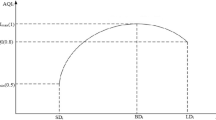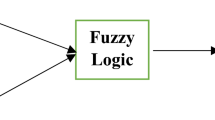Abstract
With the aim of successfully completing the construction projects, several multi-objective scheduling models (MOSMs) have been systematically developed so far. In order to alleviate the limitations of existing MOSMs, in this paper, a multi-objective scheduling model is developed as an opposition-based non-dominated sorting genetic algorithm III (OBNSGA III). The developed model employs opposition-based learning technique in NSGA III that uses opposition numbers to generate the well diverse initial population and for generation jum**. The working efficiency of developed model is demonstrated through solving a time–cost-resources-quality trade-off optimization problem of a case study project that provides a set of Pareto-optimal solutions. The paper considers that each activity has several execution modes, which are accompanied by different amount of time, cost, resources and impact on entire project quality. Based on the performance metrics, hypothesis testing and results of developed model, the comparison between developed model and those reported in literature demonstrates the usefulness of developed model in simultaneous optimization of four objectives. Besides, outcomes of the proposed model, a value path plot to visualize more than three objectives, and a priori approach to select one solution from obtained Pareto-optimal solutions makes this paper useful to researchers and construction managers.






Similar content being viewed by others
Data availability statement
Some or all data, models or code that support the findings of this study are available from the corresponding author upon reasonable request.
References
A.J.G. Babu, N. Suresh, Project management with time, cost, and quality considerations. Eur. J. Oper. Res. 88(2), 320–327 (1996)
M.Y. Cheng, D.H. Tran, Opposition-based multiple-objective differential evolution to solve the time-cost-environment impact trade-off problem in contruction projects. J. Constr. Eng. Manag. 29(5), 04001474 (2014)
I. Das, J.E. Dennis, Normal-boundary intersection: a new method for generating the Pareto surface in nonlinear multicriteria optimization problems. SIAM J. Optim. 8(3), 631–657 (1998)
K. Deb, R.B. Agrawal, Simulated binary crossover for continuous search space. Complex Syst. 9(2), 115–148 (1994)
K. Deb, M. Goyal, A combined genetic adaptive search (GeneAS) for engineering design. Comput. Sci. Inform. 26(4), 30–45 (1996)
K. Deb, H. Jain, An evolutionary many-objective optimization algorithm using reference-point-based nondominated sorting approach, part I: solving problems with box constraints. IEEE Trans. Evol. Comput. 18(4), 577–601 (2014)
K. El-Rayes, A. Kandil, Time-cost-quality trade-off analysis for highway construction. J. Constr. Eng. Manag. 131(4), 477–486 (2005)
E. Elbeltagi, M. Ammar, H. Sanad, M. Kassab, Overall multiobjective optimization of construction projects scheduling using particle swarm. Eng. Constr. Archit. Manag. 23(3), 265–282 (2016)
S.E. Elmaghraby, Activity Networks: Project Planning and Control by Network Models (Wiley, New York, 1977).
E. Fallah-Mehdipour, O. Bozorg Haddad, M.M. Rezapour Tabari, M.A. Marino, Extraction of decision alternatives in construction management projects: application and adaptation of NSGA-II and MOPSO. Expert Syst. Appl. 39(3), 2794–2803 (2012)
C.-W. Feng, L. Liu, S.A. Burns, Using genetic algorithms to solve construction time-cost trade-off problems. J. Comput. Civ. Eng. 11(3), 184–189 (1997)
J.C. Ferreira, C.M. Fonseca, A. Gaspar-Cunha, Methodology to select solutions from the pareto-optimal set: a comparative study, in Proceedings of GECCO 2007: Genetic and Evolutionary Computation Conference (2007), pp. 789–796
F. Fu, T. Zhang, A new model for solving time-cost-quality trade-off problems in construction. PLoS ONE 11(12), e0167142 (2016)
A.M. Geoffrion, J.S. Dyer, A. Feinberg, Interactive approach for multi-criterion optimization, with an application to the operation of an academic department. Manag. Sci. 19(4), 357–368 (1972)
P. Ghoddousi, E. Eshtehardian, S. Jooybanpour, A. Javanmardi, Multi-mode resource-constrained discrete time-cost-resource optimization in project scheduling using non-dominated sorting genetic algorithm. Autom. Constr. 30, 216–227 (2013)
F. Habibi, F. Barzinpour, S.J. Sadjadi, A multi-objective optimization model for project scheduling with time-varying resource requirements and capacities. J. Ind. Syst. Eng. 10(November), 92–118 (2017)
F. Habibi, F. Barzinpour, S.J. Sadjadi, Resource-constrained project scheduling problem: review of past and recent developments. J. Proj. Manag. 3, 55–88 (2018)
Hegazy, T. (2002) Computer-Based Construction Project Management, CIV E 596—CONSTRUCTION MANAGEMENT. https://doi.org/10.1016/B978-0-12-408090-4.00008-6
E. Kalhor, M. Khanzadi, E. Eshtehardian, A. Afshar, Stochastic time-cost optimization using non-dominated archiving ant colony approach. Autom. Constr. 20(8), 1193–1203 (2011)
J.E. Kelley, M.R. Walker, Critical-path planning and scheduling, in Proceedings of the Eastern Joint Computer Conference, E-AIEE-ACM 1959 (1959), pp. 160–173
K. Khalili-Damghani, M. Tavana, A.-R. Abtahi, F.J. Santos Arteaga, Solving multi-mode time-cost-quality trade-off problems under generalized precedence relations. Optim. Methods Softw. 30(5), 965–1001 (2015)
D.B. Khang, Y.M. Myint, Time, cost and quality trade-off in project management: A case study. Int. J. Project Manage. 17(4), 249–256 (1999)
M. Köppen, K. Yoshida, Many-objective particle swarm optimization by gradual leader selection, in Lecture Notes in Computer Science (Including Subseries Lecture Notes in Artificial Intelligence and Lecture Notes in Bioinformatics) (Springer, Berlin, 2007), pp. 323–331
S.S Leu, C.H. Yang, A genetic-algorithm-based resource-constrained construction scheduling system. Constr. Manage. Econ. 17(6), 767–776 (1999)
D. Liu, H. Li, H. Wang, C. Qi, T. Rose, Discrete symbiotic organisms search method for solving large-scale time-cost trade-off problem in construction scheduling. Expert Syst. Appl. (2020). https://doi.org/10.1016/j.eswa.2020.113230
D.-L. Luong, D.-H. Tran, P.T. Nguyen, Optimizing multi-mode time-cost-quality trade-off of construction project using opposition multiple objective difference evolution. Int. J. Constr. Manag. 21(3), 1–13 (2018)
W. Ma, Y. Che, H. Ke, Preemptive multi-mode resource-constrained discrete time-cost-resource optimization via non-dominated sorting genetic algorithm, in Proceedings of the 6th International Asia Conference on Industrial Engineering and Management Innovation (Atlantis Press, Paris, 2016), pp. 719–728
S. Mungle et al., A fuzzy clustering-based genetic algorithm approach for time-cost-quality trade-off problems: A case study of highway construction project. Eng. Appl. Artif. Intell. 26(8), 1953–1966 (2013)
A. Panwar, K.N. Jha, A many-objective optimization model for construction scheduling. Constr. Manag. Econ. 37(12), 727–739 (2019)
A. Panwar, K.K. Tripathi, K.N. Jha, A qualitative framework for selection of optimization algorithm for multi-objective trade-off problem in construction projects. Eng. Constr. Archit. Manag. 26(9), 1924–1945 (2019)
S. Rahnamayan, H.R. Tizhoosh, M.M.A. Salama, Opposition-based differential evolution. IEEE Trans. Evol. Comput. 12(1), 64–79 (2008)
A.B. Senouci, N.N. Eldin, Use of genetic algorithms in resource scheduling of construction projects. J. Constr. Eng. Manag. 130(6), 869–877 (2004)
M. Shahriari, Multi-objective optimization of discrete time–cost tradeoff problem in project networks using non-dominated sorting genetic algorithm. J. Ind. Eng. Int. 12, 159–169 (2016)
K. Sharma, M.K. Trivedi, Latin hypercube sampling-based NSGA-III optimization model for multimode resource constrained time–cost–quality–safety trade-off in construction projects. Int. J. Constr. Manag. (2020). https://doi.org/10.1080/15623599.2020.1843769
G. Singh, A.T. Ernst, Resource constraint scheduling with a fractional shared resource. Oper. Res. Lett. 39(5), 363–368 (2011)
R.M. Storn, K. Price, Differential evolution-A simple and efficient heuristic for global optimization over continuous space. J. Glob. Optim. 11(4), 341–359 (1997)
S. Tiwari, S. Johari, Project scheduling by integration of time cost trade-off and constrained resource scheduling. J. Inst. Eng. India Ser. A 96, 37–46 (2015)
H.R. Tizhoosh, Opposition-based learning: a new scheme for machine inteligence, in Computational Intelligence for Modelling, Control and Automation, 2005 and Int. Conf. on Intelligent Agents, Web Technologies and Internet Commerce, IEEE Xplore (2005), pp. 695–701
F. Van Den Bergh, A.P. Engelbrecht, A convergence proof for the particle swarm optimiser. Fund. Inform. 105(4), 341–374 (2010)
I.T. Yang, Using elitist particle swarm optimization to facilitate bicriterion time-cost trade-off analysis. J. Constr. Eng. Manag. 133(7), 498–505 (2007)
B. Zahraie, M. Tavakolan, Stochastic time-cost-resource utilization optimization using nondominated sorting genetic algorithm and discrete fuzzy sets. J. Constr. Eng. Manag. 135(11), 1162–1171 (2009)
H. Zhang, H. Li, Multi-objective particle swarm optimization for construction time-cost tradeoff problems. Constr. Manag. Econ. 28(1), 75–88 (2010)
H. Zheng, The bi-level optimization research for time-cost-quality-environment trade-off scheduling problem and its application to a construction project. Adv. Intell. Syst. Comput. 502, 745–753 (2017)
Acknowledgement
The authors thankfully recognize the effort of project team for assisting in data preparation.
Author information
Authors and Affiliations
Corresponding author
Additional information
Publisher's Note
Springer Nature remains neutral with regard to jurisdictional claims in published maps and institutional affiliations.
Supplementary Information
Below is the link to the electronic supplementary material.
Rights and permissions
About this article
Cite this article
Sharma, K., Trivedi, M.K. Development of Multi-Objective Scheduling Model for Construction Projects Using Opposition-Based NSGA III. J. Inst. Eng. India Ser. A 102, 435–449 (2021). https://doi.org/10.1007/s40030-021-00529-w
Received:
Accepted:
Published:
Issue Date:
DOI: https://doi.org/10.1007/s40030-021-00529-w




